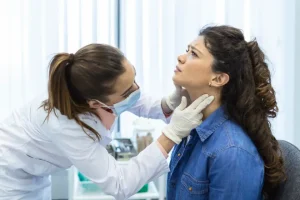How to Choose the Right Cardiologist for Your Needs
Choosing the right cardiologist is crucial for maintaining heart health, detecting disease in early stage and managing cardiovascular conditions.
By Aadicura | 08 August 2024Choosing the right cardiologist is crucial for maintaining heart health, detecting disease in early stage and managing cardiovascular conditions. This guide will help you understand cardiology, the types of conditions cardiologists diagnose and treat, and how to find the best heart specialist for your needs. We’ll also introduce you to the top cardiologists in Vadodara at Aadicura Superspeciality Hospital.
What is Cardiology?
Cardiology is a branch of medicine that deals with disorders of the heart and the blood vessels. It involves diagnosing and treating heart conditions such as coronary artery disease, heart rhythm disorders, heart failure, valvular heart disease, congenital heart defect etc. Cardiologists, often known as heart specialists, are doctors who specialise in this field. In India, they are commonly referred to as “Heart Specialists” or, in Gujarati, “હ્ય્દયરોગ ના સ્પેશિયાલિસ્ટ” or “હાર્ટ ના ડૉક્ટર.” These specialists are experts in understanding the complex functions of the heart and vascular system.
Cardiologists undergo extensive training to diagnose and treat various heart conditions. Their expertise includes interpreting electrocardiograms (ECGs), performing & interpreting ECHO, stress test, transesophageal echo, holter monitor, tilt table test, managing patients with heart attacks, performing procedures to open blocked arteries and prescribing medications to control heart disease. They also work on preventive measures to reduce the risk of heart disease in patients through lifestyle modifications, medication management, and regular monitoring.
In India, heart disease is a leading cause of mortality, making the role of cardiologists crucial in the healthcare system. Cardiologists play a vital role in both acute care, such as during a heart attack, and chronic care such as managing conditions like hypertension, heart failure, heart rhythm disturbance, high cholesterol over the long term. Their work ensures that patients receive comprehensive care tailored to their specific needs, improving both longevity and quality of life.
In summary, cardiology, or the study and treatment of heart conditions, is a critical medical specialty. Cardiologists, or heart specialists, are essential in diagnosing, treating, and preventing heart diseases, ensuring patients maintain optimal heart health.
What Can Cardiologists Diagnose and Treat?
Cardiologists are trained to diagnose and treat a wide range of heart-related conditions, including:
- Coronary Artery Disease: Blockages in the arteries that supply blood to the heart.
- Heart Attack: Occurs when a blockage cuts off blood flow to the heart muscle.
- Arrhythmias: Abnormal heart rhythms that can lead to complications.
- Heart Failure: A condition where the heart cannot pump enough blood to meet the body’s needs.
- Congenital Heart Defects: Heart problems present at birth.
- Valvular Heart Disease: Conditions affecting the valves of the heart.
- Hypertension: High blood pressure that can lead to heart problems.
- Peripheral Artery Disease: Blockages in the arteries of the limbs.
- Dyslipidemia – High cholesterol / Triglycerides
- Pericardial disease – Collection of fluid around the heart.
How Do Cardiologists Diagnose Heart Conditions?
Cardiologists use a combination of methods to diagnose heart conditions. These include:
Physical Exam and Review of Medical History
The initial step in diagnosing heart conditions involves a thorough physical examination and a review of the patient’s medical history. During the physical exam, the cardiologist checks for signs of heart disease, such as abnormal heart sounds, swelling in the legs, blood reports and irregular pulse. The medical history review helps the cardiologist understand the patient’s risk factors and symptoms.
Diagnostic Tests
To confirm a diagnosis, cardiologists use various diagnostic tests, including:
- Electrocardiogram (ECG or EKG): Measures the electrical activity of the heart.
- Echocardiogram: An ultrasound test that creates detailed images of the heart’s structure and function, helping to diagnose conditions like reduced pumping of heart due to heart attack, heart valve issues and cardiomyopathy.
- Stress Test (treadmill test or Dobutamine stress ECHO): Assesses how the heart functions under physical stress, helping to identify issues with blood flow within the heart.
- Holter Monitor: A portable device worn for 24-48 hours to monitor heart rhythms.
- Cardiac Catheterization & Coronary Angiography : Involves inserting a catheter into the heart to check for blockages.
- HUTT (Head Up Tilt Test/Tilt table Test) – To diagnose reason for transient loss of consciousness or recurrent fall.
- MRI and CT Scans: Provide detailed images of the heart and blood
What is an Interventional Cardiologist?
An interventional cardiologist is a heart specialist trained to perform procedures that diagnose and treat heart conditions. These procedures are minimally invasive, meaning they involve small incisions and use specialised instruments. Interventional cardiologists are skilled in performing procedures that can open blocked arteries, repair damaged heart valves, insert a pacemaker to treat slow heart rate and correct other heart issues without the need for major surgery.
What are the Different Types of Interventional Cardiology Procedures?
Interventional cardiologists perform a variety of procedures, including:
- Coronary Thrombectomy: Removes blood clots from the coronary arteries.
- Angioplasty: Opens blocked arteries using a balloon.
- Stenting: Places a stent (a small mesh tube) to keep arteries open.
- Atherectomy: Removes plaque from the arteries.
- Valvuloplasty: Repairs heart valves using a balloon.
- Pacemaker and ICD Implantation: Devices that help regulate heart rhythm.
- TAVI or TAVR : Insertion of artificial valve into damaged Aortic valve.
- Mitraclip : Repair of leaking mitral valve by putting a clip.
Types of Procedures Performed by Cardiologists to Treat Heart Diseases
Cardiologists perform various procedures to diagnose, treat, and manage heart diseases effectively. Common procedures include:
Cardiac Catheterization & Coronary angiography: : A diagnostic procedure where a catheter is inserted into the heart to check for blockages and other heart problems.
Angioplasty: A minimally invasive procedure to open blocked or narrowed coronary arteries, improving blood flow to the heart muscle. This involves inflating a small balloon inside the artery.
Stenting: Often performed along with angioplasty, this procedure involves placing a small mesh tube called a stent in the artery to keep it open and prevent future blockages.
Pacemaker and ICD Implantation: Inserting devices that help regulate heart rhythm and prevent sudden cardiac death in patients with severe arrhythmias.
Balloon Valve intervention: Opening of narrow heart valve.
Implantation of heart valve without surgery
Device closure: For defect/hole in heart by birth
These procedures, performed by skilled cardiologists, are crucial in managing heart diseases and improving patient outcomes. Through minimally invasive techniques, cardiologists at Aadicura Superspeciality Hospital are equipped to provide comprehensive and effective heart care.
What are Other Methods Cardiologists Use to Help Improve Heart Health?
Besides interventional procedures, cardiologists use other methods to improve heart health, such as:
Medications: Prescribe guideline directed drugs to manage blood pressure, cholesterol, and other heart-related conditions.
Lifestyle Counseling: Advise patients on diet, exercise, and smoking cessation to promote heart health.
Cardiac Rehabilitation: Programs designed to improve cardiovascular health through supervised exercise and education.
Monitoring and Follow-Up: Regular check-ups to monitor the patient’s condition and adjust treatment as needed
Tips for Finding the Best Cardiologist for Me
Finding the right cardiologist involves considering several factors:
Credentials and Experience: Look for a cardiologist with the necessary qualifications from reputed medical colleges & institutes and extensive experience.
Specialization: Choose a cardiologist specializing in your specific heart condition.
Reputation: Research the cardiologist’s reputation through patient reviews and testimonials.
Communication: Choose a cardiologist who listens to your concerns and explains treatments clearly.
Convenience: Consider the location of the heart specialist hospital in Vadodara and whether it is easily accessible.
Technology and Facilities: Ensure the cardiologist’s hospital has modern technology and facilities for accurate diagnosis and treatment.
Top Interventional Cardiologists in Vadodara, Gujarat, India
At Aadicura Superspeciality Hospital, we have a team of top interventional cardiologists dedicated to providing the best heart care. Our cardiology team includes:
Dr. Nirav Panchani MD, DM and Dr. Arpan Desai MD, DM : Our Interventional Cardiologists are known for their expertise in various cardiac interventions like simple and complex angioplasty, pacemaker implantation, valvular interventions, device closure of hole in heart etc. They are known for their patient centric approach.
Aadicura Superspeciality Hospital is renowned as the best heart specialist hospital in Vadodara, offering state-of-the-art facilities and advanced treatments for all types of heart conditions.
Frequently Asked Questions
When should I see a cardiologist?
You should see a cardiologist if you experience symptoms such as chest pain or chest heaviness, shortness of breath, palpitations, dizziness, recurrent acidity like symptoms or have a family history of heart disease. Regular check-ups are also recommended if you have risk factors like high blood pressure, diabetes, or high cholesterol, leg swelling, loss of consciousness.
What does a cardiologist do?
A cardiologist diagnoses and treats heart conditions, performs procedures to improve heart health, and provides lifestyle counseling to prevent heart disease.
How do I find the best cardiologist in Vadodara?
To find the best cardiologist in Vadodara, consider their credentials, experience, specialization, patient reviews, communication skills, and Heart hospital facilities.
What is the difference between a cardiologist and an interventional cardiologist?
A cardiologist diagnoses and treats heart conditions, while an interventional cardiologist performs minimally invasive procedures to treat heart conditions.
Why choose Aadicura Superspeciality Hospital for heart care?
Aadicura Superspeciality Hospital offers a team of experienced cardiologists, state-of-the-art facilities, comprehensive care, and a patient-centric approach, making it the best heart hospital in Vadodara.
What are the costs associated with cardiology treatments?
The costs of cardiology treatments vary depending on the procedure and the complexity of the condition. Aadicura Superspeciality Hospital offers competitive pricing and provides detailed & transparent cost estimates before treatment.
Can a cardiologist treat hypertension?
Yes, a cardiologist is an expert in treating hypertension by prescribing medications, recommending lifestyle changes, and monitoring the patient’s condition.
In conclusion, choosing the right cardiologist is essential for maintaining heart health and managing cardiovascular conditions. Aadicura Superspeciality Hospital in Vadodara offers a team of top interventional cardiologists, advanced facilities, and comprehensive care, making it the best choice for heart care in Gujarat.







